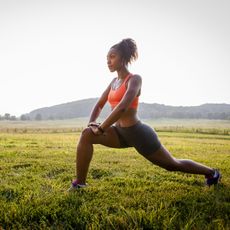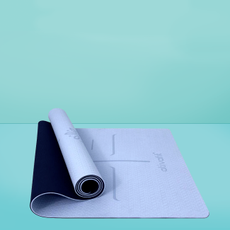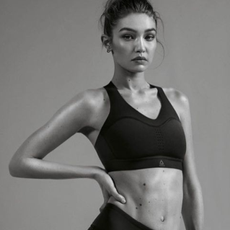Get an Olympic Workout
Amp up your workout or get psyched for a new winter sport tips from six of Team USA's top Olympic contenders headed for Vancouver this month.
TRY IT: SNOWBOARDING
THE EXPERT: Gretchen Bleiler, 28
Snowboarding began as a dude-oriented sport, but Bleiler is a pioneer for women who shred. "I push myself so I can be a role model and show women they can do it," says the Ohio native. "When I started, there weren't a lot of women snowboarders, but now, guys and girls train and travel together — snowboarding is a small and supportive community."
WOW FACTOR: Bleiler is the 2006 Olympic half-pipe silver medalist and 2008 X Games half-pipe gold-medal winner.
WANNA TRY IT? If you've never boarded before, "the first two days are tough — you'll fall a lot," says Bleiler. Give yourself a week and "absolutely take a lesson. There are simple things a coach can tell you that a friend won't know." If you get banged up, she recommends putting Dr. Hauschka Ouch! Aid Arnica Compresses directly on the bruise.
PRO MOVES: Snowboarders slam into the ground a lot, so to prevent injury they have to strengthen every muscle. Knee injuries are common, making leg workouts key. "Slow-burning stuff builds proper muscles," says Bleiler. She does single-leg dead lifts with a 20-pound barbell to fire up her hamstrings, glutes, and back. Here's how: Stand with feet hip-width apart and hold the barbell in both hands. Keep a straight back, balance on one leg, and slowly bend down like you're placing the barbell on the ground. Before you touch the floor, slowly straighten back up to standing. Bleiler does three sets of 20 on each leg.
TAKE THE STAIRS: You don't even need a gym to copy Bleiler's endurance workout — she jogs a mile to a nearby park, runs a set of stairs up and down six times, then jogs back. "Snowboarders need explosive power. Quick sprints up stairs mimic an explosive half-pipe run.
Stay In The Know
Get exclusive access to fashion and beauty trends, hot-off-the-press celebrity news, and more.
TRY IT: SHORT TRACK SPEED SKATING
THE EXPERT: Katherine Reutter, 21
Short track speed skating is pretty badass — skaters sprint around an oval track at up to 30-plus miles per hour, jockeying for position and hoping no one causes a dangerous collision. "When your technique is spot-on and you're going top speed, you feel absolutely out of control," says Reutter. "You can't think about a track pattern or who's behind you; all you can think about is how you're going to stay on your feet. It's exhilarating."
WOW FACTOR: Reutter is a three-time U.S. Champion.
WANNA TRY IT? If you crave speed and are comfortable on Rollerblades, speed skating isn't a huge leap. Go to usspeedskating.org to download technique instructions.
PRO MOVES: Get your own legs of steel with one-legged squats: Stand with your feet hip-width apart, then do a chair squat while extending one leg sideways to tap your toe on the ground. Bring the leg back in and return to standing. Do 10 to 15 slow reps on one side, then five as fast as you can. Switch sides and repeat.
RUN FOR IT: Reutter's dry-land endurance routine mimics on-ice relays: 15-second sprint, 45-second jog; repeat for 30 minutes total.
GET ROLLING Every Sunday, Reutter lies on a foam cylinder and rolls out her glutes, hips, back, and IT bands (which run down the outer thighs) to unknot muscles and make her motions more fluid.
TRY IT: ICE HOCKEY
THE EXPERT: Angela Ruggiero, 30
Ruggiero has been keeping up with the boys since she was a kid. "At a young age, I realized that people didn't want me on the ice because I was a girl, and it actually motivated me to go out there and prove myself," she says.
WOW FACTOR: Ruggiero has 1998 Olympic gold, 2002 Olympic silver, and 2006 Olympic bronze medals.
WANNA TRY IT? Penalties don't allow for fighting, so "you shouldn't worry about losing your teeth like you see in the NHL." Plus, with all the padding, you don't feel the falls.
PRO MOVES: Stationary lunges strengthen the lower body for skating. Stand in a lunge position with your front knee in line with your toes. Keeping your upper body straight, dip down so your back knee touches the floor, then straighten up. Do three sets of 10 on each leg.
TREAD HARD: During a game, "you're constantly sprinting and resting, and you can't be dead at the end of the third period," Ruggiero says. She does interval training on the treadmill to teach her system how to recover after intense play. She puts the incline up as high as she can handle and sprints as hard as she can for 30 to 45 seconds, then jumps off for a minute, and jumps back on. "I'll do eight to 10 sprints. It's such a good workout, and it only takes 15 to 20 minutes. The cool thing is that when you're done, your body is still working, unlike after a 15-minute steady jog.
TRY IT: ALPINE SKIING
THE EXPERT: Julia Mancuso, 25
Mancuso's no ski bum — she started racing at age 7 and now competes in five different events, clocking in at around 100 miles per hour during downhill events. "I've always loved the speed," she says. "It's a total rush — you use gravity and flow down the mountain."
WOW FACTOR: Mancuso is a 2006 Olympic gold medalist in giant slalom.
WANNA TRY IT? "It's never too late to start. There are 90-year-olds who ski every day," she says. "It's a fun sport you can enjoy with friends."
PRO MOVES: Alpine skiers need rock-hard core muscles and superb balance to maneuver around the obstacle poles (called gates) without falling. Mancuso works on both by standing on an agility ball, then doing eight to 12 slow chair squats. When gripping the ball, your inner thighs will want to take over, but use your glutes and outer thighs to stabilize yourself.
UPHILL BATTLE: For endurance training, Mancuso sprints up hills and slowly jogs back down about six to 12 times. "At first you feel like you're going to pass out. By sprinting uphill, I'm trying to use the maximum effort in a short amount of time.
TRY IT: FIGURE SKATING
THE EXPERT: Rachael Flatt, 17
It takes a lot of strength and endurance to make spinning across the ice look effortless, and Flatt, who is known for her high-energy skating, has always loved the sport's athletic side — particularly jumps. When she's off the ice, she combines ballet and intense gym workouts. "I have to be strong but fluid."
WOW FACTOR: Flatt is a two-time U.S. silver medalist and 2008 World Junior Champion.
WANNA TRY IT? The first thing you learn in figure skating is how to march in place, which doesn't come naturally to most people. "Bring elbow and knee pads," suggests Flatt.
PRO MOVES: To build endurance, Flatt hits the stationary bike and puts the tension "so high you have to stand to push the pedals." She then decreases the tension and spins on the bike for 20 seconds, then stops for 10, repeating the cycle for four minutes — the length of a skater's long program. "It's essentially like doing another run-through, and it makes me stronger in every respect.
TRY IT: BIATHLON
THE EXPERT: Haley Johnson, 28
The biathlon event — cross-country skiing sprints plus rounds of shooting at a target — is so physically and mentally demanding that racers often collapse the moment after they cross the finish line. "What's unique about biathlon is you use your entire body," says Johnson. And that includes your brain: "Biathlon involves two completely different sports, and training your mind helps you combine the two."
WOW FACTOR: Johnson is a member of the 2008 and 2009 World Championship Team.
WANNA TRY IT? Johnson welcomes anyone who wants to challenge herself with biathlon — even if it's a different version (e.g., running/shooting). "It's really exhilarating when you can combine two sports together in a race," she says.
PRO MOVES: Every muscle in a biathlon racer's core has to be solid with strength to hold the arms and legs in perfect form, whether she's going downhill or shooting a target. Johnson found a killer move that even hits those tough-to-target lower ab muscles: Lie flat on your back with your legs straight, hands under your hips. Using your abs, keep your back from arching and slowly lift your legs 2 to 3 inches off the ground. Hold as long as you can without clenching your thigh muscles, even if it's only for one second.
-
 Inclusivity Is This Modeling Agency's Superpower
Inclusivity Is This Modeling Agency's SuperpowerFounder (and former model) Mona Ali wants runways to look more like the real world.
By Halie LeSavage Published
-
 This New Beauty Brand Is Making More Accessible—And Very Stylish—Cosmetics for People with Disabilities
This New Beauty Brand Is Making More Accessible—And Very Stylish—Cosmetics for People with DisabilitiesWe put the cute and inclusive products to the test.
By Ariel Baker Published
-
 How Meghan Markle Got Billie Eilish to Make One L.A. Fire Victim's Dream Come True
How Meghan Markle Got Billie Eilish to Make One L.A. Fire Victim's Dream Come TrueThe Duchess of Sussex called on fans to "keep supporting those affected by the California wildfires."
By Kristin Contino Published
-
 60 Workout Apps for Women Who Want Results (Without a Gym Membership)
60 Workout Apps for Women Who Want Results (Without a Gym Membership)Easy fitness plans you can follow without fear of judgment.
By Bianca Rodriguez Published
-
 The 10 Best Workout Mats for Every Type of Exercise
The 10 Best Workout Mats for Every Type of ExerciseDoing yoga or HIIT in your home gym just got so much better.
By Stefani Sassos, MS, RDN, CSO, CDN, NASM-CPT, Good Housekeeping Institute Published
-
 Exercise, Periods, Showering—It's All Different for Women in Space
Exercise, Periods, Showering—It's All Different for Women in SpaceNASA astronaut Serena Auñón-Chancellor explains what a beauty, health, and fitness routine is like for women in space.
By Maya Allen Published
-
 5 Mental Health Apps That Professionals Recommend
5 Mental Health Apps That Professionals RecommendYou are not alone.
By Bianca Rodriguez Published
-
 Why Did I Have a Miscarriage?
Why Did I Have a Miscarriage?Despite persistent group-think to the contrary, miscarriage is incredibly common. And it isn't caused by exercise, flying, or other lifestyle choices. The main reason a pregnancy ends early? A chromosomal issue. Read on to learn more.
By Jennifer Gerson Published
-
 How Pippa Middleton Is Using Ballet To Stay Fit During Pregnancy
How Pippa Middleton Is Using Ballet To Stay Fit During Pregnancy"I'm determined not to break into a penguin-style waddle."
By Amanda Mitchell Published
-
 Reebok's New Sports Bra Uses Space Technology for Maximum Support
Reebok's New Sports Bra Uses Space Technology for Maximum SupportFor boobs that defy gravity.
By Megan DiTrolio Published
-
 What Alicia Vikander Eats to Get Her Six-Pack
What Alicia Vikander Eats to Get Her Six-PackThere's no slacking when you're playing Lara Croft.
By Chelsea Peng Published